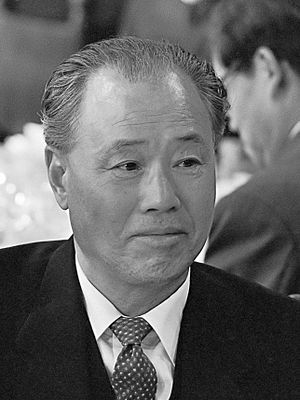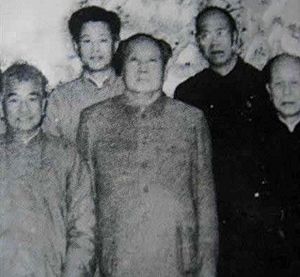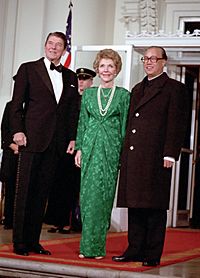Zhao Ziyang facts for kids
Quick facts for kids
Zhao Ziyang
|
|
|---|---|
| 赵紫阳 | |

Zhao in 1985
|
|
| General Secretary of the Chinese Communist Party | |
| In office 15 January 1987 – 24 June 1989 |
|
| Preceded by | Hu Yaobang |
| Succeeded by | Jiang Zemin |
| 3rd Premier of the People's Republic of China | |
| In office 10 September 1980 – 24 November 1987 |
|
| President | Li Xiannian (since 1983) |
| Vice Premier | |
| Leader | Deng Xiaoping |
| Preceded by | Hua Guofeng |
| Succeeded by | Li Peng |
| Vice Chairman of the Chinese People's Political Consultative Conference | |
| In office 8 March 1978 – 17 June 1983 |
|
| Chairman | Deng Xiaoping |
| Secretary General | Liu Lantao |
| Vice Chairman of the Chinese Communist Party | |
| In office 29 June 1981 – 12 September 1982 Serving with
|
|
| Chairman | Hu Yaobang |
| First Vice Chairman of the Central Military Commission | |
| In office 1 November 1987 – 23 June 1989 Serving with Yang Shangkun
|
|
| Chairman | Deng Xiaoping |
| Secretary-General | Yang Shangkun |
| Personal details | |
| Born |
Zhao Xiuye
17 October 1919 Hua County, Henan, Republic of China |
| Died | 17 January 2005 (aged 85) Beijing, People's Republic of China |
| Resting place | Changping District, Beijing |
| Political party | Chinese Communist (from 1938) |
| Spouse |
Liang Boqi
(m. 1944) |
| Children | 6 |
| Signature |  |
|
Central institution membership
1987–1989: 13th Central Military Commission
1980–1989: 11th, 12th, 13th Politburo Standing Committee 1979–1989: 11th, 12th, 13th Politburo 1972–1989: 9th, 10th, 11th, 12th, 13th Central Committee ?–1989: 7th National People's Congress Other offices held
1987–1989: Vice Chairman, State Central Military Commission
1987–1989: Vice Chairman, Party Central Military Commission 1981–1982: Vice Chairman, Central Committee 1980–1989: Leader, Leading Group for Financial and Economic Affairs 1975–1980: Governor, Sichuan Province 1975–1980: Party Committee Secretary, Sichuan Province 1974–1975: Governor, Guangdong Province 1974–1975: Party Committee Secretary, Guangdong Province 1965–1967: Party Committee Secretary, Guangdong Province |
|
| a. | |
Zhao Ziyang (Chinese: 赵紫阳; 17 October 1919 – 17 January 2005) was an important Chinese politician. He served as the third Premier of China from 1980 to 1987. Later, he became the leader of the Chinese Communist Party (CCP) from 1987 to 1989.
Zhao was known for leading many economic changes in China. He supported opening up the country's economy and making it more market-friendly. However, he lost his power because of his support for the student protests in 1989. After this, he was kept under house arrest for the rest of his life.
Contents
Zhao Ziyang's Early Life and Career

Zhao Ziyang was born Zhao Xiuye in Hua County, Henan. He changed his name to "Ziyang" when he was in middle school. His family was wealthy. Zhao joined the Communist Youth League in 1932 and became a full member of the Communist Party in 1938.
He served in the People's Liberation Army during the Second Sino-Japanese War and the Chinese Civil War. His jobs were mostly about managing things, not fighting. In the late 1930s, he was the party chief of Hua County, where he met his wife, Liang Boqi. They married in 1944.
Zhao became more well-known in Guangdong in the early 1950s. During the Great Leap Forward (1958–1961), a time of severe food shortages, Zhao tried to help farmers. He secretly allowed them to sell their crops and profit from their work. This helped reduce starvation in areas where his plans were used.
His experiences during this time made him believe in more moderate economic policies. He supported bringing back some private farming and trade. He also helped break up the "People's Communes," which were large collective farms. These changes helped China's farming recover. By 1965, Zhao was the Party secretary of Guangdong province.
However, during the Cultural Revolution (1966–1976), Zhao was removed from his positions. He was publicly criticized and spent time in political exile.
Return to Government and Reforms
Zhao Ziyang spent four years working in a factory in Hunan. In 1971, he was called back to Beijing by Premier Zhou Enlai. He was then appointed as a deputy Party chief in Inner Mongolia.
After returning to government, Zhao became a key person in China's economic changes. Even though he had no formal training in economics, he played a big role in guiding China's economy.
Economic Changes in Sichuan Province
In 1975, Zhao became the top official in Sichuan province. Sichuan was China's most populated province but had been badly hurt by past policies. People there were struggling to find food.
Zhao introduced successful market-focused changes in Sichuan. He allowed families to use farmland for private use and let farmers sell their crops freely. These changes greatly increased farming and factory production within three years. Zhao became very popular in Sichuan. People had a saying: "If you want to eat, look for Ziyang."
Becoming a National Leader
After Deng Xiaoping became China's top leader in 1978, he saw Zhao's success in Sichuan. Deng promoted Zhao to higher positions in the Communist Party. In 1980, Zhao joined the Politburo Standing Committee, which is China's highest ruling group.
Zhao became the Premier of China in 1980. His job was to bring his successful farming reforms to the whole country. Between 1980 and 1984, China's farm production grew by 50%.

As Premier, Zhao made many important changes. He set up Special economic zones in coastal areas to attract foreign money and boost exports. He also started the 863 Program to help China develop new technologies. Zhao's reforms led to fast growth in farming and light industry during the 1980s. He also worked to improve China's relationships with Western countries to help its economy grow.
Zhao also allowed the British pop group Wham! to visit China in 1985. This was the first visit by a Western pop group and was seen as a big step in improving cultural ties between China and the West.
Zhao believed that economic progress was connected to more openness. He thought that China needed to try different economic ideas to boost production. He also suggested separating the roles of the Party and the government.
In 1987, Zhao became the General Secretary of the Chinese Communist Party. This made him the most powerful person in the Party. He replaced Hu Yaobang, who had been forced to resign. Zhao's time as General Secretary was seen as a very open period in China. There was more freedom of speech and freedom of the press, allowing people to express their ideas more freely.
New Financial Ideas
Zhao helped introduce the stock market in China. In 1984, with his support, cities like Beijing and Shanghai started experimenting with a joint-stock system. This meant companies could issue shares to their workers. In 1985, the first company in Shanghai publicly sold shares, attracting many investors. Zhao wanted this system to be used across the country.
He also played a big role in deciding how to change prices in the economy. He chose a gradual approach rather than a sudden "shock therapy" method. His reforms aimed to make businesses more energetic and efficient.
Tiananmen Square Protests
Zhao was General Secretary for just over a year when the Tiananmen Square protests of 1989 began. These protests started after the death of Hu Yaobang, who was admired for his reform ideas. People were also unhappy about rising prices and corruption. Students, thinkers, and other city residents joined the protests. They asked for more economic freedom, political openness, media freedom, and an end to corruption.
Zhao felt sympathetic towards the protesters. While he was away on a trip, other leaders, including Premier Li Peng, convinced Deng Xiaoping that the protests were a threat. An article was published in the People's Daily calling the protests "anti-Party and anti-socialist." This made the protests grow even larger.
Zhao tried to calm the situation by talking with student groups. He suggested government changes, like investigating corruption. However, he felt his efforts were blocked by others in the leadership.
On May 17, Zhao met with Deng Xiaoping and other leaders. Zhao suggested changing the newspaper article to reduce tensions. But Deng decided to declare martial law. Zhao disagreed with this decision.
Zhao's Last Public Appearance
Early on May 19, Zhao went to Tiananmen Square and spoke to the students. He used a megaphone and told them, "We are already old, and do not matter." This was his last public appearance. He had been removed from his position by other Party leaders just before this visit.
The protests continued, and on June 4, the government used military force to clear the square, leading to many deaths.
After the events, Zhao was officially dismissed from all his positions. The Party said he had "made the mistake of supporting the turmoil and splitting the party." He was then placed under house arrest. Jiang Zemin replaced him as General Secretary. Zhao's name was removed from most public records in China, and he was even airbrushed out of photographs.
Life Under House Arrest
Zhao lived under house arrest for the next fifteen years in Beijing. He was with his wife in a traditional Chinese house. He was closely watched and needed permission to leave his home or have visitors. Sometimes, he was allowed to go on vacation within China, always under supervision.
Even though he was under house arrest, Zhao was never formally charged with any crime. He was still allowed to read secret government documents.
After 1989, Zhao continued to disagree with the government's official view of the Tiananmen protests. He believed the government was wrong and that the Party should re-examine its actions. He wrote letters to the Chinese government asking for a new look at the events, but these were never published in mainland China. Over time, Zhao came to believe that China should have a free press, freedom of assembly, an independent judiciary, and a multiparty democracy.
Zhao Ziyang died from a stroke in Beijing in January 2005. Because of his political fall, he did not receive the usual funeral honors given to high-ranking Chinese officials. His secret memoirs, recorded on cassette tapes, were later published in 2009. These memoirs gave more details about his life and his thoughts on China's future.
Images for kids
See also
 In Spanish: Zhao Ziyang para niños
In Spanish: Zhao Ziyang para niños
- Politics of the People's Republic of China
- History of the People's Republic of China
- Censorship in the People's Republic of China
- Internet censorship in the People's Republic of China
- Human rights in the People's Republic of China
 | Delilah Pierce |
 | Gordon Parks |
 | Augusta Savage |
 | Charles Ethan Porter |



